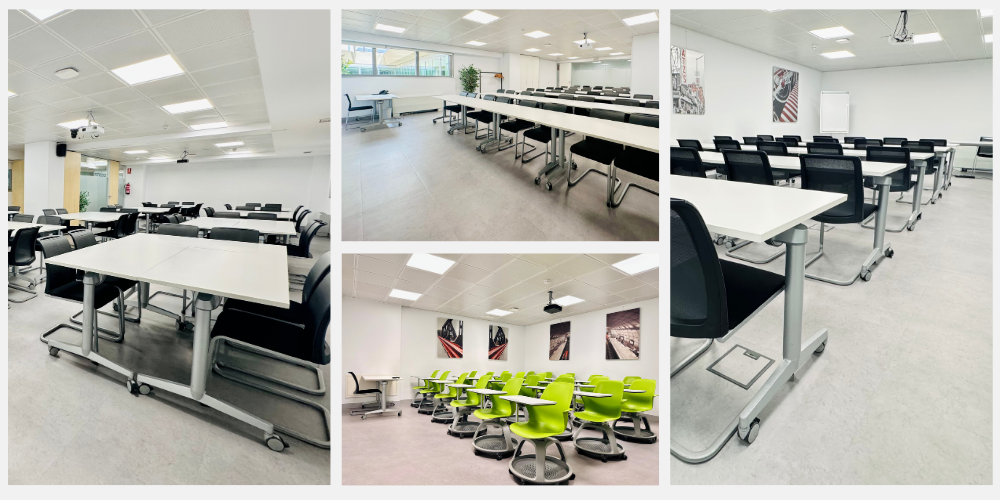Impact and lessons for the offices of the future
Last Monday, 28 April, we experienced an unusual situation in Spain: a widespread power blackout that affected the entire Iberian Peninsula, paralysing a large part of the country’s activity for several hours. Cities such as Madrid and Barcelona were practically disconnected from the digital world, transport came to a standstill, and daily life took an unexpected turn.
For those of us who work in office environments, and especially in flexible spaces such as those at Ibercenter, this massive power cut was a trial by fire. Beyond the anecdote, the event forces us to reflect on how we deal with emergencies, how prepared we are and what we can improve for the future.
In this article we review what happened during the major blackout, how it impacted companies, how we at Ibercenter acted to support our customers and what lessons we draw from this experience that was as unusual as it was revealing.
What happened on 28 April 2025?
At 12:33 pm, suddenly and without warning, there was a power cut that left the entire Iberian Peninsula without electricity. Spain, Portugal, Andorra and part of southern France were affected by a general blackout that lasted several hours and had immediate consequences in all areas: transport, communications, health services, shops and, of course, offices.
The magnitude of the outage was such that more than half of the system’s energy demand was lost in a matter of seconds. This forced the Iberian grid to be disconnected from the European electricity system as a protective measure. From that moment on, a complex recovery operation began, gradually restoring supply, although in some areas normality was not restored until the following day.
The authorities are still investigating the exact causes. Although it was initially ruled out as a meteorological phenomenon, the possibility of a technical failure or even computer sabotage is still on the table. The Audiencia Nacional has already opened an investigation to clarify the facts.
What is clear is that, for a few hours, we were almost back to the 20th century: no internet, no lifts, no emails and, in many cases, no possibility of even working or communicating. An unexpected reminder of how dependent we are on technology… and how important it is to be prepared for when it fails.
What was the impact?
The 28 April blackout not only left us without power: it also confronted us, at a stroke, with how vulnerable our work routines can be when technology suddenly disappears. Within minutes, many offices were completely inoperative: computers down, servers inaccessible, phone systems down, and a total disconnection from the outside world.
In buildings without generators or backup systems, even basic functions such as riding the lift or turning on a lamp became impossible. Scheduled meetings, both face-to-face and online, were cancelled or left up in the air. Many businesses saw key operations disrupted, and teams had to improvise with what they had on hand: notebooks, pens and mobile phones with batteries (while they lasted).
In coworking spaces and shared offices, the impact was even more visible: with no Wi-Fi, no charging points, and many professionals and freelancers trying to figure out what was going on, the working day was virtually suspended.
In addition, the lack of real-time information created uncertainty. The mobile network also suffered outages, making it difficult to communicate with customers, suppliers or even colleagues. Some businesses opted to close temporarily, others tried to carry on as best they could, adapting as they went along.
This situation, although exceptional, brought something fundamental to the table: the importance of having contingency plans, back-up analogue tools and working environments that can adapt quickly to unforeseen events. Yes, technology is key, but responsiveness is even more so.
How do we manage it?
At Ibercenter, we are used to managing unforeseen situations, but 28 April was a challenge out of the ordinary. Faced with an outage of this magnitude, the most important thing for us was to act quickly, stay calm and focus on the essentials: the safety and well-being of the people who work in our spaces every day.
As soon as the power outage was detected, our teams activated the emergency protocols foreseen for critical situations. Although the power grid was completely down, the emergency lighting systems and evacuation signs worked properly, ensuring a safe exit from the buildings for those who decided to interrupt their day and return home.
Our site managers immediately informed customers, both in person and via the available channels, about the situation and the steps to be taken. Many users particularly appreciated this proximity: amid the general confusion, having someone to explain what is happening and help you make decisions makes all the difference.
In addition, common areas were set up as meeting points to resolve doubts, share information and, in some cases, simply wait for the connection to be re-established. We know that, at times like this, a gesture as simple as offering a bottle of water or facilitating a quiet conversation can go a long way.
Once power was gradually restored, we checked all installations to ensure that the restart was safe and orderly. We also sent subsequent communications to all our customers with a summary of what happened and recommendations for future eventualities.
These types of episodes remind us that, although you can’t control everything, you can be prepared. And at Ibercenter, that preparation is part of our daily commitment to the people and companies that place their trust in us.
What have we learned?
The 28 April blackout was an unexpected reminder of something we often take for granted: the fragility of the systems that underpin our day-to-day lives. At Ibercenter, we have always been committed to technology and efficiency, but also to resilience. This experience has allowed us to test our protocols and, above all, to learn from them.
One of the main lessons learned from this situation is the importance of having well-defined contingency plans, not only at a technical level, but also at a human level. Having a prepared team that knows how to act in critical situations is as important as having emergency lighting or security systems.
We have also seen the value of immediate and transparent communication. During the most critical hours of the outage, simply having staff present, accessible and willing to inform and help made a huge difference to our customers. Empathy, in these cases, is as important as infrastructure.
In the wake of this event, Ibercenter has initiated a complete overhaul of our power backup and connectivity systems. We are evaluating the incorporation of new solutions such as backup batteries, agreements with alternative suppliers and improvements in internal communication channels for emergencies.
In addition, we will reinforce internal training for our teams and share with our customers some practical guidelines on how to act in the event of future service interruptions, however unlikely they may seem.
Because if one thing has become clear to us, it is that being prepared does not eliminate problems, but it does make a difference in how we deal with them. And at Ibercenter, we continue to work to ensure that our spaces are not only flexible and functional, but also safe and reliable, whatever happens.
Conclusion
What happened on 28 April took us all by surprise. Nobody expects an entire country to be without electricity for hours at a time in 2025. But that is precisely why it is important to learn lessons and reinforce what we can do.
At Ibercenter, we believe that difficult times are also an opportunity to improve. The blackout put not only the infrastructure to the test, but also the response capacity, organisation and commitment of all of us who are part of this community. And the balance, within the exceptionality, was positive: our spaces remained a safe environment, the team responded quickly and professionally, and our customers were supported in an unexpected context.
We know that we cannot avoid the unexpected, but we can be better prepared to deal with it. That is why we will continue to invest in more resilient systems, in continuous training and in an office model that combines flexibility with reliability.
Because working in an environment that is prepared for the unexpected is not just a technical issue: it is a way of taking care of people. And at Ibercenter, that always comes first.
Business Center in Madrid | Flexy Office in Madrid




